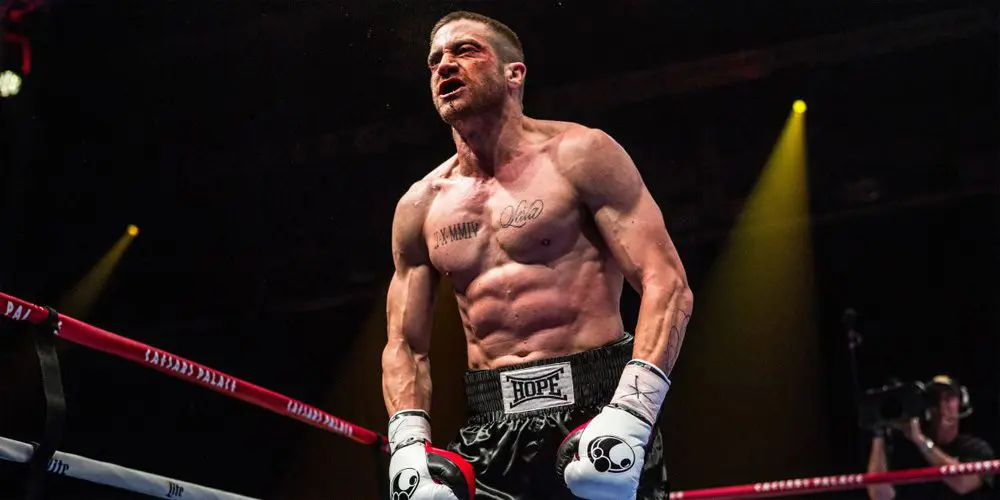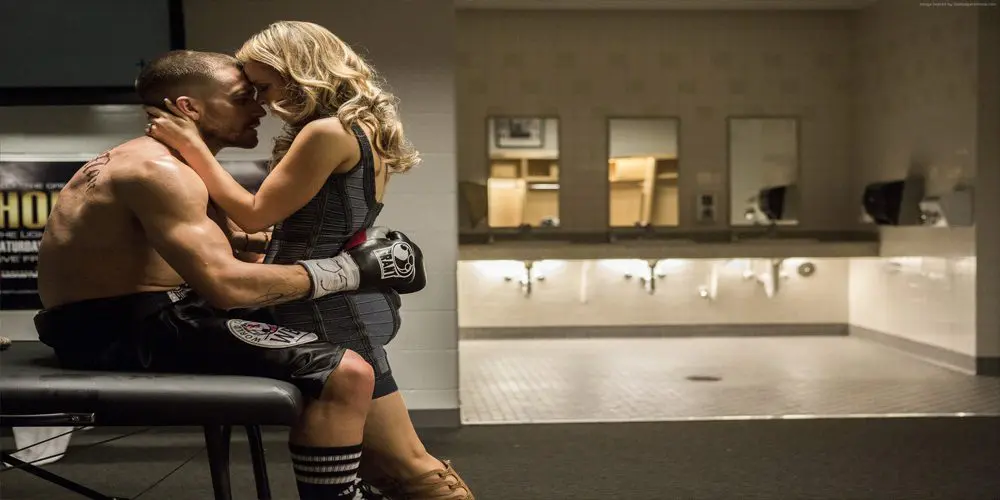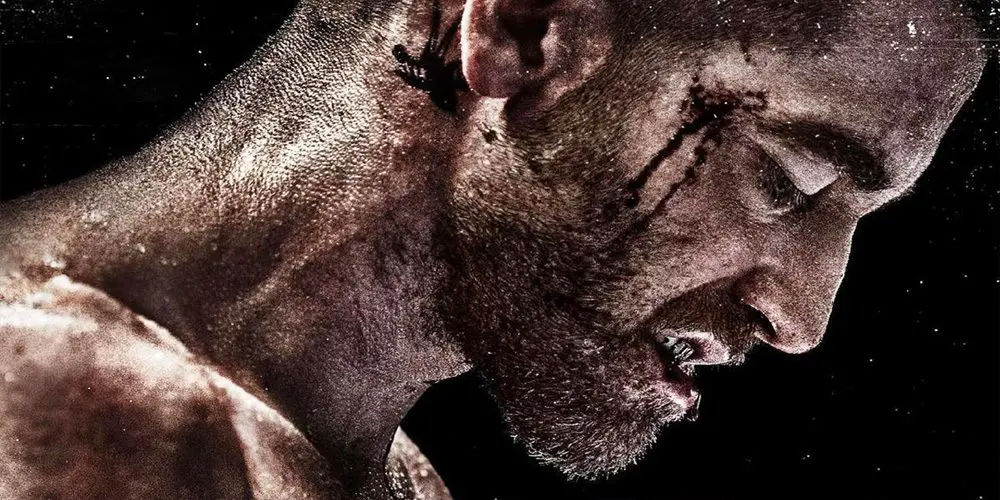Summary
Southpaw tries to build a quintessential boxing drama around a thoroughly unbelievable character, and thanks to sloppy writing and direction ends up punching above its weight.
There have only been a handful of times that I’ve felt truly uncomfortable being a sports fan, and almost all of them are attached in some way to boxing. It’s inevitable, really. The sport doesn’t align with any regular person’s moral compass. It’s openly corrupt and populated, for the most part, with distinctly unlikeable characters. The most prominent of them is Floyd Mayweather Jr., who, in 2015, clinically dissected the Philippines’ Manny Pacquiao to cement his legacy as the greatest and most reviled professional boxer of his generation. Mayweather’s a true goatee-stroking bad guy: shallow, arrogant, abusive, ludicrously wealthy. People really hate him, and some of that vitriol is unjust. Being good at something is usually enough to reliably attract the ire of those who aren’t, and Mayweather is better at boxing than anyone else is at anything. But some of it is deserved. Among the twelve world titles and numerous other accolades on his résumé are two convictions for striking a woman, and a litany of other domestic violence allegations. And people don’t like the way he fights, which gradually, one round at a time, reminds everyone that boxing is not the movies and that the bad guy doesn’t always lose. Not in boxing, and not in life.
Boxing movies aren’t – have never been, really – original. But what they do is romanticise that aspect of the sport that has always rebelled against Hollywood’s idea of heroes, villains, and how the two relate to one another. In these movies, the hero is almost always white, even though in reality the sport has been dominated, famously and for the last 50 years, by black and Latino men. In these movies, the villains – the thugs, the criminals, the corruptors and corrupted – are always vanquished, either in the ring or the eyes of the public. In these movies those flamboyant champions like Floyd Mayweather, who place money and extravagance over family and good, honest, old-fashioned hard work, those champions aren’t real. They’re illusory or temporary and by the end, they’re gone. After every Mayweather fight, there’s always an outpouring of aggrieved spectators who insist that the fight was rigged, or Floyd was doped, or the other guy was injured. Nobody really knows how to accept or understand the fact that the bad guy probably won’t ever receive his comeuppance.
Southpaw isn’t like that. From its opening scenes, you know exactly what it’s going to be and that’s exactly what it ends up being. In it, Jake Gyllenhaal plays a Hell’s Kitchen light-heavyweight champion who, at the start of the movie, has never lost a fight and has just won his 43rd. His fighting style is dramatically-mandated to be hazardous to his health. It’s another Hollywood thing. Referees in these movies won’t call a fight until one guy has laid down for a ten-count, so Gyllenhaal’s character, Billy Hope, eats blows until he accumulates enough fury to unleash fight-ending haymakers in the closing rounds. He’s like a Street Fighter character in the hands of a player who only knows how the special moves work. He looks like one, too – Gyllenhaal slimmed down and bulked up for the role, so his skin doesn’t fit right anymore. He’s bulging and rippling with muscle and veins snake around his arms like hosepipes.
Billy’s wife, Maureen (Rachel McAdams), tells him he can’t fight like this anymore. Maybe it’s time to hang it all up for good. What’s the point of this big house if he’s too punch-drunk to live in it? Besides, they have a ten-year-old daughter, Leila (Oona Laurence), who’s smart and funny, idolizes them both and needs her parents the way they need each other. So Billy’s willing to concede; but not to the young, hungry up-and-comer who, after an awkward, halting speech at a charity function, taunts Billy and his entourage into a melee. Fists fly, a gun is accidentally discharged, and the fallout sends Billy into a spiral of addiction. He loses his belt in a fight he wasn’t prepared for, and then his money and his house and his boxing licence when he strikes the referee who intervened. His manager (50 Cent) sees him bottoming-out and cuts his losses. He’s a danger to himself and to others, especially Leila, who gets sucked into the foster care system, and Miguel Escobar (Miguel Gomez), the fighter who assumes Billy’s mantle as light-heavyweight king and whose brother might have pulled the trigger which cost him everything. He hits rock bottom with his back against the cold floor and his big, crazy eyes staring up at the lights.

According to Leila’s caseworker (Naomie Harris), the only way Billy is getting beyond supervised visitation is with a job, so he looks for one in the only place he understands: a boxing gym, this one owned and run by a washed-up, half-blind former fighter named Tick Wills (Forrest Whittaker), who coached the only man Billy felt ever beat him in the ring. The road to recovery winds directly through Tick’s gym, which is a surrogate home to the kind of inner-city kids who need to escape their broken ones. The kids help Billy reconnect with reality; Tick helps him develop all the skills he never had in the ring, such as rhythm and timing and strategy, a good left hand and a solid defence. Nobody ever points out these are unusual deficiencies for a former undefeated titleholder to have, which is one of Southpaw’s problems. Another is all the cardboard cut-out characters who pop up like fairground targets throughout these passages. I watched the movie last night and I already forgot all of their names. But they might as well have been Plot Device or Emotional Moment. At least then they’d be performing as advertised.
Sometimes you see a trailer or read the billing for a movie and you just think: That’ll work. The pieces align. You’re all in on Jake Gyllenhaal playing a boxer because you know he’ll be all in on it too. That’s his gift. He knows how to take a role and locate whichever part of it he can aggressively latch onto. His characters never feel organic – he squeezes too much of himself into them. In End of Watch he played a tough, blinkered Los Angeles cop; in Nightcrawler he played a flamboyantly weird media vulture. But it’s always Gyllenhaal playing something. You never get the sense these are real people who exist independently of the movie they’re in. And that’s fine because it’s so interesting to see what he does with them. Billy Hope is masochistic and anguished and the performance matches, sometimes to an unsettling degree. At one point Gyllenhaal’s screaming into a mattress, a loaded gun nearby, and you feel as if Southpaw has something real to say about grief. But you quickly realize it’s a piece of acting committed to a movie which doesn’t know how to unpack it. The material surrounding Gyllenhaal keeps threatening to upstage his hard work.
Southpaw wants to hit the same emotional notes as Rocky and other from-the-ashes sports dramas. Kurt Sutter wrote the movie, Antoine Fuqua directed, and both were working from a well-worn genre template; without, it seems, any intention of assembling all the clichés into a new or interesting composition. That’s fine, in theory. But some of those movies Southpaw aspires to work on the strength of character and writing, not performance. We bought Rocky Balboa as an underdog because when we met him it was in decrepit Philadelphia gyms, where he was scraping hard-fought victories over nobodies. Billy Hope is introduced to us as a champion, so when Roy Jones Jr., on commentary as himself, insists that he’s never seen him block a punch before, you have to ask who’s buying into this. Gyllenhaal’s running at enough rpms to make the whole movie shudder, but not enough to drag it out of the mud when the wheels start spinning.
Sutter is primarily responsible for Sons of Anarchy, a biker melodrama which also had a lot to say about fathers and their daughters. Here he tries to filter Billy’s redemption through that lens, but the movie’s idea of pathos is so mechanical that nothing feels fresher for that perspective. At one point Leila has to slap her father and tell him that she hates him, that she wishes he were dead; at another, she goes through her homework and asks him if she’s spelling “dismantled” and “hopelessness” correctly. These scenes are more on-the-nose than any of the actual fights, where at least Gyllenhaal can let his physicality do most of the work for him. Oona Laurence’s performance might be more noteworthy than even his; the screenplay asks her to pull the rug out from beneath Billy every time he finds his footing, but she acts her way around the manipulation and still makes Leila empathetic. It’s another performance, like Gyllenhaal’s, that should complement the movie, but instead just makes you notice the effort.

Billy Hope is the second role I’m aware of that was written specifically for and then turned down by Eminem. (The first was the lead in Elysium, which was somehow passed over by both him and Ninja from Die Antwoord before eventually landing in the lap of Matt Damon). You can see it, both as a dramatization of Marshall Mathers’ widely-publicised issues with his daughter and her mother, and as a metaphor for his struggle to establish himself in an industry and strata of popular culture which was, and in many ways still is, actively hostile to white artists. He keeps a credit as the soundtrack’s executive producer, and a single from it, “Phenomenal”, plays over Billy’s obligatory training montage. But this is Gyllenhaal’s movie through and through, so you wish there was more of it for him to push against.
It has to be said there’s nothing all that compelling about a guy not being able to hit with his left. Southpaw wants to be about more than that, but this is a lot of movie with very little else to say. Maybe the suffering is supposed to be the appeal, or at least Billy’s succeeding in spite of it. The movie’s determined to plunge him through one personal tragedy after another. But how much trauma can be visited on one man in a two-hour period before it starts to feel phoney? When does it stop being about how much Billy can tolerate and start being about how much the audience can? I’m not entirely sure, but Southpaw treads a fine line between the two. It’s not an easy watch, even if it isn’t an actively unpleasant one. I have two little girls and I’ve been part of a drawn-out custody battle, and there’s a rawness to how Southpaw presents that which feels almost real. But too much of that reality is smothered by the melodrama, which is so furious and unrelenting that it becomes almost comic. You’re against the ropes the whole time, but you’re not being held there by skill or strategy or technique – just weight.




